|
Advantech ARK-3500
Compact rugged, versatile fanless embedded industrial Box PC with plenty of connectivity, PCI or PCI Express expansion, and Intel Ivy Bridge processing power
(by Conrad H. Blickenstorfer; photography by Carol Cotton)
This report is about the Advantech ARK-3500, a compact, fanless Box IPC with excellent connectivity and also with something extra: room for two PCI or PCI Express expansion cards. In the picture below we added a standard Microsoft mouse to give an idea of the relative size of this industrial PC. It's quite compact, measuring just 11.4 x 9.13 x 4.33 inches and weighing a bit over ten pounds. The reason why the ARK-3500 is a bit taller and heavier than some of Advantech's super-compact fanless industrial PCs is its ability to accommodate those standard PCI or PCIe expansion cards. In this day and age of everything being integrated into a motherboard, and often into the processor itself, why is this still important?
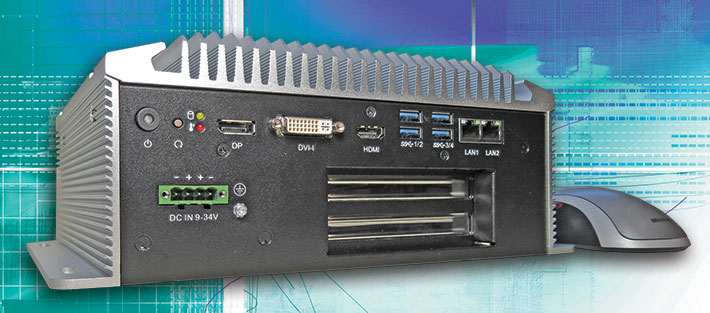
The answer is that embedded systems projects often have very special requirements that simply can't be met by any standard embedded board or industrial PC. Systems integrators then have to resort to specialized peripheral components to fill these requirements, and that's where PCI and PCIe come in.
For when a project needs PCI and PCI Express
PCI stands for "Peripheral Component Interconnect." It's the specification for a local bus standard that's been around since 1992 when Intel created it as a faster, more advanced bus interface replacement for the earlier ISA, EISA, MCA and VLB bus standards. A vast number of PCI expansion boards became available and many still exist today.
In 2004, a group of leading computer makers introduced PCIe, also called PCI Express, as a faster replacement for PCI and a number of other standards. Unlike PCI which used just one connector format, PCIe connectors come in various lengths, depending on how many "lanes" the peripheral card has. PCI Express connectors can be ×1, ×4, ×8, ×12, ×16 or ×32, signifying the number of "lanes" available for various application and throughput requirements.
To cover as many potential applications as possible, Advantech actually offers two versions of the ARK-3500:
- The ARK-3500P has two PCI connectors and can accommodate two half-length, full-height PCI expansion cards, which means cards up to 180 mm long and up to 110 mm tall.
- The ARK-3500F has two PCIe connector, one of them a PCI4 x 1 and the other a PCIe x 4. Here again, the actual cards cannot be larger than 180 x 110 mm.
Wide range of processor options
So much for the primary distinguishing feature of the ARK-3500. Now how about available processing power? Here, Advantech considered the fact that projects that require PCI or PCI Express expansion capability may have vastly different computing performance requirements. As a result, Advantech is offering an unusually wide range processor options, as shown in the table below.
|
Available ARK-3500 CPUs
|
Intel Core i7
|
Intel Core i5
|
Intel Core i3
|
Intel Celeron
|
|
Model
|
3610QE
|
3610ME
|
3120ME
|
1020E
|
|
Cores/Threads
|
4/8
|
2/4
|
2/4
|
2/2
|
|
Base Clock Speed
|
2.30 GHz
|
2.70 GHz
|
2.40 GHz
|
2.20 GHz
|
|
Turbo Speed
|
3.30 GHz
|
3.30 GHz
|
No turbo
|
No turbo
|
|
Thermal Design Power (TDP)
|
45 watts
|
35 watts
|
35 watts
|
35 watts
|
|
Smart Cache
|
6MB
|
3MB
|
3MB
|
2MB
|
|
Integrated graphics
|
HD Graphics 4000
|
HD Graphics 4000
|
HD Graphics 4000
|
HD Graphics
|
|
Graphics base speed
|
650 MHz
|
650 MHz
|
650 MHz
|
650 MHz
|
|
Graphics max speed
|
1,000 MHz
|
950 MHz
|
900 MHz
|
1,000 MHz
|
|
PCI Express Rev
|
3.0
|
3.0
|
2.0
|
2.0
|
|
Intel Virtualization
|
Yes
|
Yes
|
No
|
No
|
|
AES New Instructions
|
Yes
|
Yes
|
No
|
No
|
|
Intel Trusted Execution
|
Yes
|
Yes
|
No
|
No
|
|
Intel vPro
|
Yes
|
Yes
|
No
|
No
|
For the past several years, Intel has generally taken the approach that of its available Core processors, i3 means good, i5 means better, and i7 means best. That's vastly over-simplifying matters, especially since there's often significant overlap between these processor categories. What's true is that, by and large, i7 chips have more of the good stuff than i5 chips, and those have more than i3 processors. To further complicate matters, there are also still Pentium and Celeron branded chips, and those can be either part of the Core architecture family or the much lower-end Atom processor family.
Anyway, for the ARK-3500, Advantech chose a quartet of Intel "Ivy Bridge" 3rd generation Core processors, starting with the comparatively lowly dual-core Celeron 1020E and the Core i3-3120ME that's also dual core design and also lacks turbo boost, but uses four threads. A major difference here is that the Celeron uses the older Intel HD Graphics whereas the i3 chip has the more powerful HD Graphics 4000 with 16 instead of just six execution units.
Of the two high end i5 and i7 choices, both support native PCI Express Rev 3 for much higher data loads, both include a larger number of potentially mandatory Intel technologies (such as vPro or Trusted Execution), and both offer "Turbo Speed" to handle temporary processing load peaks. The i5-3610ME, however, is still a dual-core design whereas the i7-3610QE offers four processor cores and eight threads. To see full spec table for these three CPUs, see here.
Superb steel/aluminum design and execution
Like almost all fanless industrial PCs Advantech makes, the ARK-3500 is a compact, heavy-duty aluminum and steel design. Steel is used for the case itself, and aluminum for the massive heatsink and heatspreader that dissipates the considerable heat generated by a standard-voltage installed in a small enclosure without any fan. The picture compilation below shows the ARK-3500 from top and all four sides.
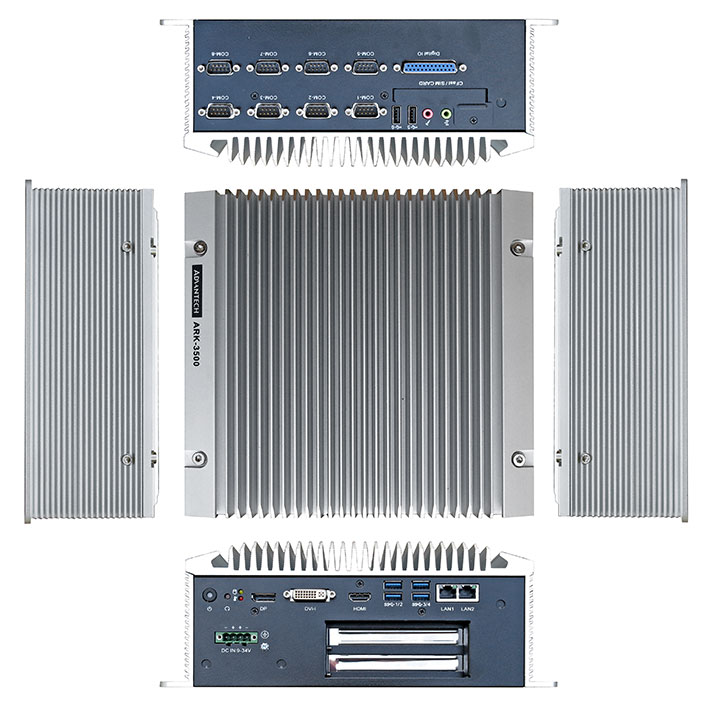
What's instantly obvious, of course, is the large number of standard size ports. Superior wired connectivity has long been a hallmark of industrial PCS, as has been their ability to support both contemporary and legacy interface technologies. Our review ARK-3500 was configured to offer the following external ports:
- 4 x USB 3.0
- 2 x USB 2.0
- 4 x Serial RS232
- 4 x Serial RS232/422/485 with auto flow control
- 2 x RJ-45 gigabit LAN
- 1 x Digital I/O
- Power (9 to 34 Volt DC)
- 1 x DVI-I video with VGA support
- 1 x HDMI
- 1 x DisplayPort
- Audio microphone-in, line-in and line-out
Unlike with most Advantech industrial PCs we've examined in the RuggedPCReview.com lab, the ARK-3500's aluminum heatsink top doesn't come off to provide access to the interior of the device. Instead, the steel bottom plate and the two aluminum side pieces come off. 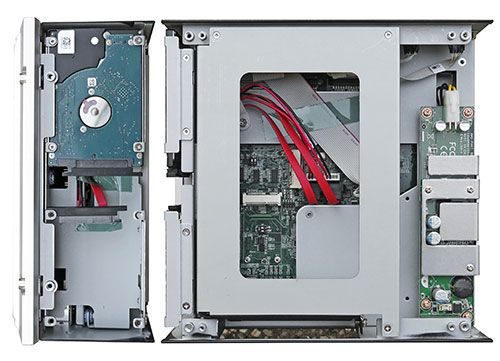 This provides easy access to the area inside that's reserved for the PCI or PCIe cards, as well as to mass storage. This provides easy access to the area inside that's reserved for the PCI or PCIe cards, as well as to mass storage.
Disassembly and reassembly are very easy: the steel bottom plate is held in place with four small Philips head screws, the two aluminum side heat spreaders with four hex bolts each. Note that this bottom-access design has the potentially considerable advantage of discouraging component or storage device theft, as secure mounting of the ARK device makes getting into the device virtually impossible for thieves.
The ARK-3500 can accommodate one or two 2.5-inch hard disks or solid state disks of the same format up to 9.5 mm thick. The SATA II, Gen 3 interface supports a maximum data transfer rate of 500 MB/s, and with two disks or SSDs present, users can set them up in RAID 0 ("striping" — spreading data over both disks for extra speed) or RAID 1 ("mirroring" — writing the same content on both disks, so as to have a backup) arrangement.
Mass storage devices have their own steel subframe that's rubber-mounted onto the main steel frame. There's also a CFast card slot, CFast being a faster, Serial ATA version of Compact Flash.
The importance of processor and storage choices
Our review unit came with the low-end Celeron 1020E option, and therefore represents the lowest performance level for this platform. To provide an idea of the relative performance of the Celeron-equipped version of the ARK-3500, we ran our two standard benchmark suites, PassMark and CrystalMark. For comparison, we're also listing the results of three fairly recent reviews of other Advantech IPCs, those being the high-performance super-compact ARK-2150, the AIIS-1240 compact system for automated optical inspection systems, and the super-compact ITA-1610 which is an economical, full Windows computing platform based on an Intel Atom platform.
|
Advantech Intel-based IPC Benchmarks and Comparisons
|
|
PERFORMANCE COMPARISON
|
Advantech
|
Advantech
|
Advantech
|
Advantech
|
|
Model
|
ARK-3500
|
ARK-2150L
|
AIIS-1240
|
ITA-1610
|
|
Model (click pic for review)
|

|

|

|

|
|
Year tested
|
2015
|
2013
|
2014
|
2014
|
|
Intel processor
|
Celeron 1020E
|
Core i7-3517UE
|
Core i7-3770
|
Atom D525
|
]
|
CPU Speed
|
2.2 GHz
|
1.7/2.8 GHz
|
3.4/3.9 GHz
|
1.8 GHz
|
|
Thermal Design Power (TDP)
|
35 watts
|
17 watts
|
77 watts
|
13 watts
|
|
CPU Mark
|
2,198.0
|
3,164.8
|
8,820.9
|
556.8
|
|
2D Graphics Mark
|
415.0
|
475.8
|
696.5
|
182.7
|
|
Memory Mark
|
923.3
|
826.7
|
1,420.5
|
266.2
|
|
Disk Mark
|
733.0
|
1,322.0
|
519.5
|
101.8
|
|
3D Graphics Mark
|
233.0
|
253.1
|
476.4
|
106.8
|
|
Overall PassMark
|
974.9
|
1,382.1
|
2,895.9
|
257.0
|
|
CM ALU
|
25,977
|
41,554
|
84,049
|
12,214
|
|
CM FPU
|
20,351
|
39,544
|
68,910
|
10,276
|
|
CM MEM
|
27,444
|
23,799
|
47,498
|
8,649
|
|
CM HDD
|
11,377
|
34,772
|
8,325
|
5,381
|
|
CM GDI
|
12,202
|
11,924
|
17,856
|
2,798
|
|
CM D2D
|
1,991
|
1,713
|
8,411
|
3,481
|
|
CM OGL
|
5,010
|
6,318
|
10,417
|
787
|
|
Overall CrystalMark
|
104,074
|
159,902
|
245,466
|
43,586
|
Note that unlike many of RuggedPCReview's benchmark comparisons, this one is not meant to show how competitors compare, but what different types of processors can do in Advantech industrial PCs. And again, our test results show the benchmark numbers of an ARK-3500 equipped with the least powerful processor option. The high-end i7-3610QE chip available would at least double the numbers.
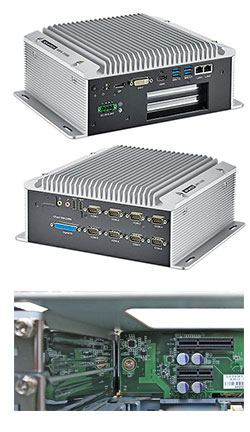 That said, note that any Intel Core processor equipped systems will outscore anything with older Intel Atom chips by a very wide margin. I say "older" Intel Atom chips as certain Intel "Bay Trail" processors, which are based on the latest Atom architecture but also sold at the high end under the Celeron and even Pentium brands, considerably close the gap between high-end Atom and low-end Core CPUs. That said, note that any Intel Core processor equipped systems will outscore anything with older Intel Atom chips by a very wide margin. I say "older" Intel Atom chips as certain Intel "Bay Trail" processors, which are based on the latest Atom architecture but also sold at the high end under the Celeron and even Pentium brands, considerably close the gap between high-end Atom and low-end Core CPUs.
Also note that TDP (thermal design power) is usually, but not always, a good indicator of overall processor performance. In our comparison here, for example, the 77 watt quad-core i7-3770 uses in its AIIS-1240 optical inspection system trounces everything else. But although the Celeron 1020E used in our test ARK-3500 has a TDP of 35 watts, it's easily outscored by the ultra-low voltage 17 watt Core i7-3517UE used in the ARK-2150L. The primary difference here is that the i7 has turbo boost and four threads whereas the two-thread Celeron doesn't.
Note other differences as well. Depending on system use, the type of mass storage can make a huge difference. Conventional hard disks are much slower than almost any type of solid state disk, and among SSDs types there are vast performance differences as well.
What all this means is that customers should view available processor and memory/storage options not as pesky extra-cost items, but as important parts of the decisionmaking process when configuring a project. The wrong choice can have far-reaching consequences in terms of performance, customer satisfaction, and TOC.
Like many Advantech embedded products, the ARK-3500 supports iManager, SUSIAccess and Embedded Software APIs that can be used to monitor, configure, and control terminals in a centralized, real-time maintenance system. Our review system also included Advantech's Booting Manager, EWF (Enhanced Write Filter) Manager, and a FBWF (File Based Write Manager) utility.
ARK-3500: PCI or PCIe plus great configuration options
RuggedPCReview's overall assessment of the Advantech ARK-3500: a compact, fanless industrial PC specifically designed for those who need either PCI or PCIe expansion in their project. It's the additional volume needed to accommodate up to two half-size PCI cards that makes this IPC a bit taller and heavier than other compact IPCs from Advantech. The ARK-3500 also offers a considerable range of processor performance and storage options, so as to suit the largest variety of possible deployments possible.
-- Conrad H. Blickenstorfer, January 2015
Advantech ARK-3500 Fanless Box PC Specs:
| Status |
Added 01/2015
|
| Type |
Fanless Box IPC
|
| CPU Type |
2.2GHz Intel Celeron 1020E as tested
|
| Chipset |
Intel QM77
|
| BIOS |
AMI EFI 64Mbit
|
| Memory |
Max 16GB DDR3/DDR3L 1600MHz in 2 204-pin SODIMM sockets |
| Graphics Controller |
Integrated Intel HD Graphics |
| Watchdog Timer |
255-level timer intervals, software setup |
| Graphics: VGA
|
Integrated in DVI-I port |
| Graphics: HDMI |
HDMI 1.4; supports 1920 x 1200 @ 60 Hz |
| Graphics: DisplayPort |
2560 x 1600 pixel |
| Graphics: Dual Display |
Yes
/td>
|
| LAN |
2 x 10/100/1000 Mbps (Intel 82579LM and I-210IT) LAN RJ45 |
| Storage |
2 x SATA 2.5" HDD with SATA III, Gen 3 support, 1 x CFast card slot
|
| Housing |
Steel/aluminum with desk/wall mounts
|
| Vibration |
With SSD: 5 Grms, IEC 60068-2-64, random, 5 ~ 500 Hz, 1 hr/axis.
|
| Shock |
With SSD: 50 Grms, IEC 60068-2-27, half sine, 11 ms duration.
|
| EMC |
CE/FCC Class A, CCC, BSMI
|
| Safety |
CB, UL, CCC, BSMI
|
| Operating temperature |
With SSD: 14° to 140°F (-10° to °60C)
|
| USB |
4 x USB 3.0, 2 x USB 2.0
|
| Serial |
4 x RS232 serial, 4 x RS232/422/485 w/ auto flow control |
| Audio |
HD Audio Realtek ALC892 chipset, line-in + line-out jacks |
| Expansion |
2 x full-size Mini PCIe with SIM holders |
| Add-on slots |
2 x PCI (max 110 x 180 mm) OR 1 x PCIe x 1 + 1 x PCIe x 4 (max 110 x 180 mm) |
| DIO |
16-bit programmable GPIO |
| Size |
11.4 x 9.13 x 4.33 inches (290 x 232 x 110 mm)
|
| Weight |
10.6 pounds (4.8 kg) |
| Power |
9 to 34VDC via AC/DC adapter
|
| Price |
Inquire |
| Webpage |
Advantech ARK-3500 page
|
| Datasheet |
 ARK-3500 ARK-3500 |
| Contact |
Advantech Corporation
13 Whatney
Irvine, CA 92618
Toll Free: 1-800-866-6008
Ph: 949-420-2500
Fax: 949-420-2501
ISGinfo@advantech.com
www.advantech.com
Advantech Co. Ltd.
No.1, Alley 20, Lane 26, Rueiguang Road
Neihu District, Taipei Taiwan 114, R.O.C.
Tel: 886-2-2792-7818
Fax: 886-2-2794-7301
www.advantech.com
|
|

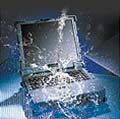

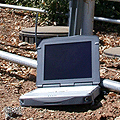

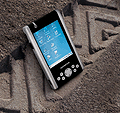
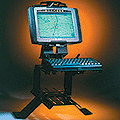







 This provides easy access to the area inside that's reserved for the PCI or PCIe cards, as well as to mass storage.
This provides easy access to the area inside that's reserved for the PCI or PCIe cards, as well as to mass storage.




 That said, note that any Intel Core processor equipped systems will outscore anything with older Intel Atom chips by a very wide margin. I say "older" Intel Atom chips as certain Intel "Bay Trail" processors, which are based on the latest Atom architecture but also sold at the high end under the Celeron and even Pentium brands, considerably close the gap between high-end Atom and low-end Core CPUs.
That said, note that any Intel Core processor equipped systems will outscore anything with older Intel Atom chips by a very wide margin. I say "older" Intel Atom chips as certain Intel "Bay Trail" processors, which are based on the latest Atom architecture but also sold at the high end under the Celeron and even Pentium brands, considerably close the gap between high-end Atom and low-end Core CPUs.
